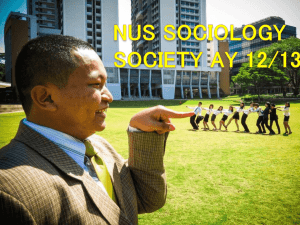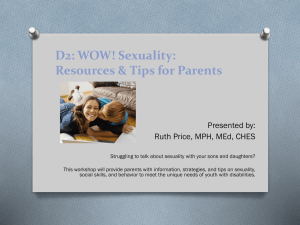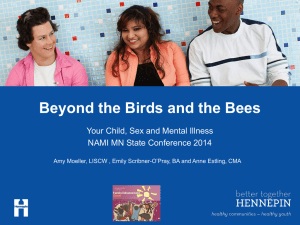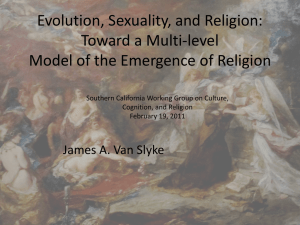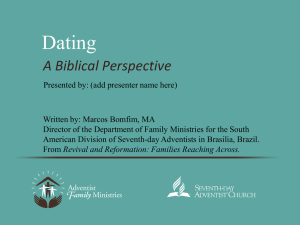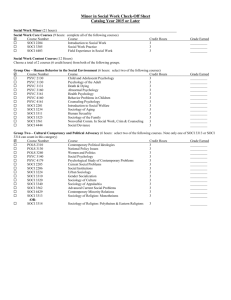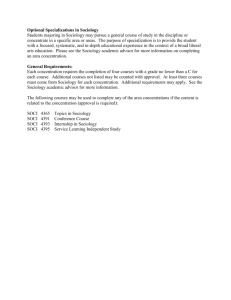Fall 2011
advertisement
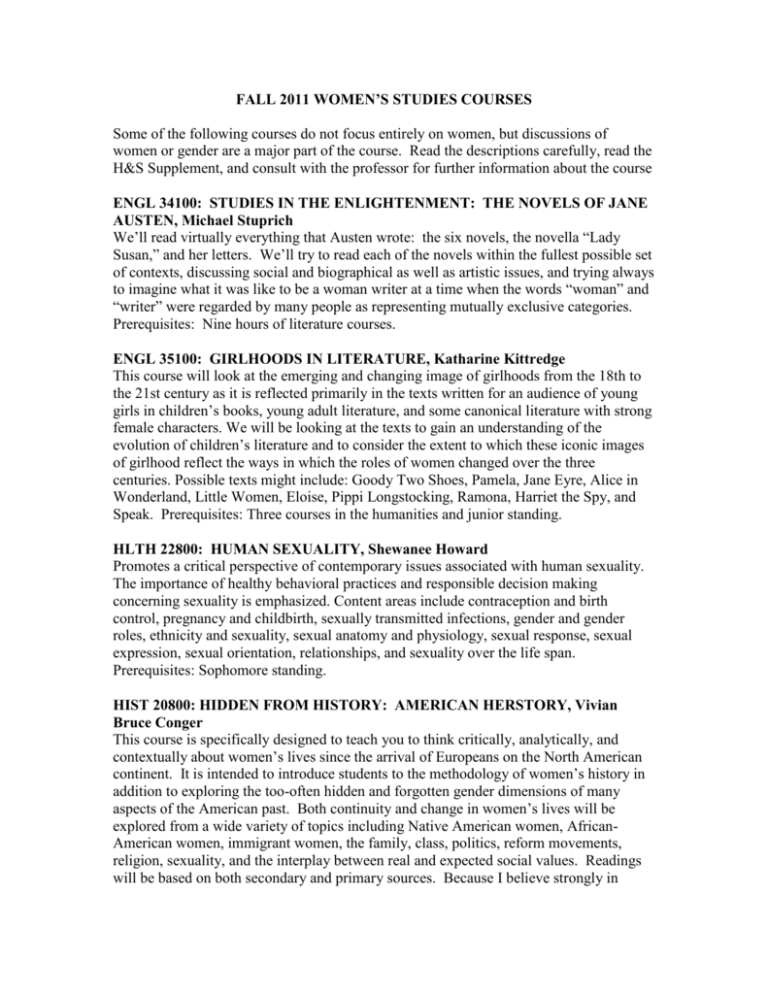
FALL 2011 WOMEN’S STUDIES COURSES Some of the following courses do not focus entirely on women, but discussions of women or gender are a major part of the course. Read the descriptions carefully, read the H&S Supplement, and consult with the professor for further information about the course ENGL 34100: STUDIES IN THE ENLIGHTENMENT: THE NOVELS OF JANE AUSTEN, Michael Stuprich We’ll read virtually everything that Austen wrote: the six novels, the novella “Lady Susan,” and her letters. We’ll try to read each of the novels within the fullest possible set of contexts, discussing social and biographical as well as artistic issues, and trying always to imagine what it was like to be a woman writer at a time when the words “woman” and “writer” were regarded by many people as representing mutually exclusive categories. Prerequisites: Nine hours of literature courses. ENGL 35100: GIRLHOODS IN LITERATURE, Katharine Kittredge This course will look at the emerging and changing image of girlhoods from the 18th to the 21st century as it is reflected primarily in the texts written for an audience of young girls in children’s books, young adult literature, and some canonical literature with strong female characters. We will be looking at the texts to gain an understanding of the evolution of children’s literature and to consider the extent to which these iconic images of girlhood reflect the ways in which the roles of women changed over the three centuries. Possible texts might include: Goody Two Shoes, Pamela, Jane Eyre, Alice in Wonderland, Little Women, Eloise, Pippi Longstocking, Ramona, Harriet the Spy, and Speak. Prerequisites: Three courses in the humanities and junior standing. HLTH 22800: HUMAN SEXUALITY, Shewanee Howard Promotes a critical perspective of contemporary issues associated with human sexuality. The importance of healthy behavioral practices and responsible decision making concerning sexuality is emphasized. Content areas include contraception and birth control, pregnancy and childbirth, sexually transmitted infections, gender and gender roles, ethnicity and sexuality, sexual anatomy and physiology, sexual response, sexual expression, sexual orientation, relationships, and sexuality over the life span. Prerequisites: Sophomore standing. HIST 20800: HIDDEN FROM HISTORY: AMERICAN HERSTORY, Vivian Bruce Conger This course is specifically designed to teach you to think critically, analytically, and contextually about women’s lives since the arrival of Europeans on the North American continent. It is intended to introduce students to the methodology of women’s history in addition to exploring the too-often hidden and forgotten gender dimensions of many aspects of the American past. Both continuity and change in women’s lives will be explored from a wide variety of topics including Native American women, AfricanAmerican women, immigrant women, the family, class, politics, reform movements, religion, sexuality, and the interplay between real and expected social values. Readings will be based on both secondary and primary sources. Because I believe strongly in letting women tell their own stories you will have many opportunities to “hear women’s voices” through letters, diaries, journals, and autobiographies. HIST 48102: GENDER, NATION, AND CITIZENSHIP IN MODERN EUROPE, Karin Breuer From the word “fatherland” to the phrase “mother tongue,” it is clear that there is an association between gender, the state, and national sentiment. This seminar will examine the often overlooked connection between gender and nationality since the French Revolution of 1789. In this class we will examine questions such as “What difference does it make to our understandings of nationalism and citizenship when gender is taken into account?” “How do gender and other identities (e.g., class and race) intersect with constructions of national belonging?” We will read primary documents, scholarly articles, and historical monographs. Prerequisites: Permission of instructor and senior standing. MUNM 25500: WOMEN IN MUSIC, Louise Mygatt An examination of the music and lives of women in various musical settings, beginning with classical music in medieval Europe and shifting, in the 20th century, to popular music in the United States. The class examines women's roles and contributions as singers, instrumentalists, composers, and conductors, as well as the challenges facing women as professional musicians. These are viewed within the context of society's perception of women at the time. Listening and analytical skills are developed through studying the music itself. The class is designed for non-music majors, with no musical background necessary, and issues raised are relevant to both men and women. This course may be used as a music elective for the bachelor of music degree or as a liberal arts elective for the bachelor of arts in music degree. Prerequisites: Sophomore standing. POLT 14100: POWER: RACE, SEX AND CLASS, Zillah Eisenstein We will deal with the distribution of power in the U.S. according to economic class, sex, and race hierarchies. We discuss what power is, where it comes from, where it is located. This involves the analysis of power in terms of issues of capitalism, globalism, patriarchy, and racism, as well as the specific issues they raise for policy making, persons, the family, and corporate power. The analysis will hopefully help us understand the relations of power defining black working class women, white male workers, white middle class women, etc. The premise of the course is that in order to understand capitalist society one must understand the racialized aspects of sexuality as a form of power, as well as the sexualized aspects of race. Some specific topics discussed are: the present global and national economic crisis; changing aspects of the nation-state; Bush/Cheney’s wars of/on terror; the Gulf Wars 1991-2009; the Chilean 1973 Coup; Obama’s politics of hope; the changing realities of the middle/working class; the global racialized sexual division of labor; the rise of China in the global market; the O.J. Simpson trial, and so on. POLT 34200: LIBERALISM AND MARXISM: THEORIZING CAPITALISM, SLAVERY, AND PATRIARCHY, Zillah Eisenstein This course intends to open students to thinking theoretically and within historical context. We examine and query the relationship between liberalism and Marxism in terms of sexual, racial, and economic class hierarchies. The course deals with the capitalist division of labor and its relation to the racist and patriarchal sexual division of labor in slavery. The theorists studies are: Thomas Hobbes, John Locke, JJ Rousseau, Karl Marx, JS Mill, Sri Aurobindo, Rosa Luxemburg, and Maria Stewart. Our study looks to significant conflicts between Marxism and liberalism with in their theories of private property and individuality. And, we look to the similarities within these theories on masculinist privilege and slave-trade relations. Constructs of nature, natural, democracy, civilization, rationality, inclusivity, and humanity are explored. Prerequisites: Three courses in social sciences or equivalent. SOCI 21000: WOMEN'S LIVES, Judith Barker To understand women's experiences in our society from a sociological and feminist perspective as well as recognizing the differences among women by age, class, race, and sexual orientation. Areas covered include social construction of gender; gender and culture; sexuality; work; health and reproduction; religion; crime and deviance; power and politics; social reform; and new directions. Prerequisites: One course in the social sciences. SOCI 21300: SOCIOLOGY OF SEXUALITIES, Rebecca Plante Most of ‘the sexual’ fascinates and vexes most of us, whether we are scholars, students, or scientists. Regardless of sexual orientation, preferences, and activities, sexuality impacts us throughout our lives. This course will give students a unique opportunity to merge the personal interests with a social scientific framework, analysis, and theories. We will examine how individuals are socially contextualized and how something as seemingly personal and individual as sexuality has a much broader context. Throughout the semester, we will delve into some of the mysteries of sexualities, orientations, and activities. Prerequisites: One course in the social sciences or sophomore standing. SOCI 24600 ST: GENDER, THE ENVIRONMENT, AND GLOBAL CHANGE, Alicia Swords This course explores the interconnections between gender and human relations with the environment. We study the histories and contemporary realities of patriarchy,colonialism, capitalist development, globalization, and environmental crises. Authors include historians, ecologists, feminists, and social and environmental activists. Special focus is on US and international case studies of social movements that propose alternatives to current gender hierarchies and environmental degradation, including feminist, indigenous, and environmental justice movements. SOCI 32800: DRUGS & SOCIETY, Kimberly Baker The American experience with illicit drugs is complex. On the one hand, we have more access to psychoactive drugs than any other society. On the other hand, we control and punish drug use more than any other society. This course is designed to analyze this complex situation from multiple angles with specific attention to the ways that our cultural understandings of drugs, drug use, and drug policy are racialized, class-based, and gendered. Prerequisites: SOCI 10100 or SOCI 10200 and junior standing. SOCI 33800 ST: GLOBAL VIOLENCE AGAINST WOMEN, Nina Cummings To provide an overview of gender relations worldwide, as well as an analysis of the historical, theoretical and methodological perspectives that create the context for gender terrorism and violence against women. The consequences of violence are social, economic, physical and psychological which transforms the violence from a cultural or criminal issue to one of health and human rights. It is within this context that the impact of the violence will be examined, as well as the promising practices worldwide that combat “gender terrorism”. Prerequisites: SOCI 10100 or SOCI 10200 and two additional courses in the social sciences. SOCI 33801 ST: SEXUALITY & HEALTH, Lis Maurer This course explores the intersections of sexuality and health and focuses on both as social concepts. We will investigate the manner in which sexuality and health are shaped by individual, social and cultural factors and how ideas about our bodies and our sexuality are related to ideas about our health. The course will examine intersections and relationships between sexuality and health, both across populations and in minority and stigmatized communities; describe and assess key frameworks for understanding sexual health and sexuality; explore the various ways social norms, beliefs, and attitudes can impact sexual health; analyze and explore sexual health issues such as race, ethnicity, socioeconomic class, HIV and STDs, sexual violence, sexual orientation, gender identity, ability/disability, sexual dysfunction, aging, and body image; and gain a deeper understanding and appreciation for the various ways in which social concepts of sexuality and identity can impact health. Prerequisites: SOCI 10100 or SOCI 10200 and two additional courses in the social sciences. SOCI 33802 ST: HOOKING UP: THE SOCIOLOGY OF INTIMACY, Rebecca Plante This course will allow students to use upper-level social scientific knowledge to explore intimate relationships; the focus is on the United States but cross-cultural data will also be used. We will use gender as the major variable to illuminate the historical, material, and social contexts of intimate relationships and intimacy. Throughout the course, we’ll also address race, class, ethnicity, and sexual orientation. Students will be expected to challenge their taken-for-granted assumptions about the intersections between individuals and broader social structures. Prerequisites: SOCI 10100 or SOCI 10200 and two additional courses in the social sciences. SOCI 42500: SEMINAR: SOCIOLOGICAL FEMINIST THEORY, Judith Barker (1) To examine some of the approaches to women and empowerment in feminist social theory. (2) To facilitate a process in which we are able to feel more comfortable with abstract theory and participating in discussions about theory. (3) To develop a better understanding of theory in general and howoverall developments in sociological theory affect feminism. Prerequisites: Permission of instructor and senior standing. SOCI 43500 ST: FEMINIST PERSPECTIVES ON LAW, Kim Baker This seminar examines feminist jurisprudence as a distinct project that explores how feminist legal theorists have thought about sex, gender and sexuality in understanding and critiquing our legal system and its patriarchal norms. This course will be composed of two sections. The first is an exploration and critique of theoretical issues about the interaction between law and gender. The second is the application of a feminist perspective to areas of law such as reproduction, battering, pornography, prostitution, rape and employment. Prerequisites: SOCI 10100 or SOCI 10200 and three courses in the social sciences with at least one at level 3. SPCM 34600: GENDER AND INTERPERSONAL COMMUNICATION, Laurie Arliss Advanced theoretical examination of interpersonal communication, concentrating on nonverbal communication, language, power, gender, and characteristics of and problems in interpersonal relationships. Prerequisites: SPCM 14000 or SPCM 14900; two courses in the social sciences; sophomore standing. SPMM 29800: GENDER ISSUES IN SPORT, Ellen Staurowsky This course is designed to focus on the central role gender plays in the formulation of understandings and expectations individuals entertain about sport in American culture. An overview of selected psycho-social, historical, and philosophical issues that shape the nature and scope of men's and women's participation in sport and physical activity will be presented. Particular emphasis will be placed on the social construction of gender in a predominant male value system and how female and male sport experience is defined and constrained by that system. Prerequisites: sophomore standing. WMST 10000-01, 02: INTRODUCTION TO WOMEN'S STUDIES, Vera Whisman In this introductory course, designed for students with an interest in Women's Studies, students will focus primarily on women's issues and experiences in contemporary U.S. culture, with attention to the experiences of women in cultures outside of the U.S. Beginning with the idea that "women" is not a monolithic category, the course includes an exploration of issues of race, class, and gender as they have impacted and continue to impact women. Topics may include: an introduction to feminism/s; an overview of contemporary feminist theories and the social construction of sex and gender; women's narratives; women's history, including the history of women's resistance and activism; and contemporary issues of importance to women, including: sexuality, physiology, body image, reproduction, motherhood, politics, and legal issues including sexual and domestic violence, reproductive rights, and medical issues. Open to all interested students; required for the Women's Studies minor. WRTG 27002 WOMEN AND FAIRY TALES, Katharyn Machan “Women and Fairy Tales” will offer the opportunity for challenging, truly interdisciplinary study of a body of literature long important to personal and global understanding. The scope of scholarship about fairy tales is, of course, vast; this seminar will focus on female roles presented primarily (though not exclusively) in the stories gathered by Jacob and Wilhelm Grimm—a focus particularly valuable for our students, especially those who will pursue graduate study and write and publish, with the imminent 200th anniversary of the release of these folklorists’ first collection. Students will be asked to examine, question, and form their own ideas about not only the depictions of women in fairy tales, but the positive and negative effects of these characterizations— archetypes and stereotypes--on listeners and readers through the ages. Only open to members of the Ithaca College Honors Program.



